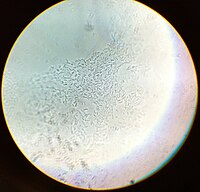
Photo from wikipedia
Abstract Clostridium acetobutylicum is an attractive industrial microorganism for biochemical production, but there have been few attempts for bio-hydrogen production based on metabolic engineering. In this study, metabolically engineered C.… Click to show full abstract
Abstract Clostridium acetobutylicum is an attractive industrial microorganism for biochemical production, but there have been few attempts for bio-hydrogen production based on metabolic engineering. In this study, metabolically engineered C. acetobutylicum carrying glucose-6-phosphate dehydrogenase (zwf) and FeFe hydrogenase (hydA) were constructed as recombinant strains CA-zwf(pIMP-zwf) and CA-hydA(pMTL-hydA), respectively, to improve hydrogen productivity. The results showed that the engineered strains produced 1.15 and 1.39-fold higher hydrogen yield, respectively, than the wild type. Furthermore, when pH and glucose concentration were optimized for the CA-hydA strain, enhanced hydrogen productivity of 25.8% was achieved in 7 L jar scale fermentation. This result provides an insight into the future direction for metabolic engineering of C. acetobutylicum for improved hydrogen production.
Journal Title: International Journal of Hydrogen Energy
Year Published: 2021
Link to full text (if available)
Share on Social Media: Sign Up to like & get
recommendations!